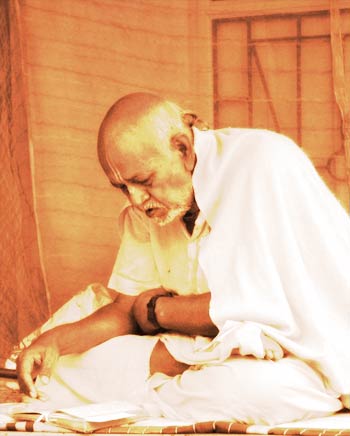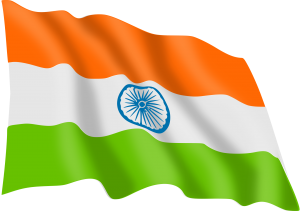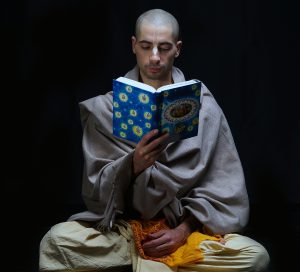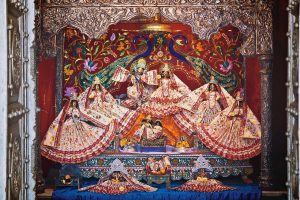
If we refer to Indians as those who live in India, that would be too simplistic a definition. Such a definition would not bring out the true characteristics of an Indian. One can hardly be called an Indian if he does not respect and follow the values and attributes for which ancient India stood, and for which it attained the pinnacle of glory among all other civilizations of the world. Even the West, with all its material prosperity, looks upon India with awe and reverence for its wonderful culture and civilization. An Indian would, therefore, be one who conducts oneself in accordance with the age-old practices and systems strictly enjoined by the ancient Vedas.
not bring out the true characteristics of an Indian. One can hardly be called an Indian if he does not respect and follow the values and attributes for which ancient India stood, and for which it attained the pinnacle of glory among all other civilizations of the world. Even the West, with all its material prosperity, looks upon India with awe and reverence for its wonderful culture and civilization. An Indian would, therefore, be one who conducts oneself in accordance with the age-old practices and systems strictly enjoined by the ancient Vedas.
In ancient times the teachings of the Vedas formed the basis of conduct and behaviour and made India famous. In those times, people respected and whole-heartedly followed the Vedic philosophy, and also practiced it in their lives.
Acceptance of the spirit of the Vedic precepts was symbolized, for example, by the men keeping a śikha, a tuft of hair on the upper backside of the head which was never trimmed nor shaved. With the lapse of time, however, the incursion of Western ideas made a mockery of this practice, relegating the Vedic precepts to the storehouse of non-importance.
The Vedas aspired to teach self-realization, or the knowledge of Brahma, and only a true Indian could attain this. He who did not possess this attribute failed to qualify himself as an Indian.
All the ancient scriptures, including the Vedas, were written in Sanskrit—the classical language. The word Sanskrit literally means ‘pure’ or ‘refined’. No language other than Sanskrit is capable of explaining Brahma in all its nuances and connotations.
sarvasya cāhaṁ hṛdi sanniviṣṭo
mattaḥ smṛtir jñānam apohanaṁ ca
vedaiś ca sarvair aham eva vedyo
vedānta-kṛd veda-vid eva cāham
(Bhagavad-gītā 15.15)
I am situated as Antaryāmī in the hearts of all living entities. From Me come remembrance, knowledge and forgetfulness. By all the Vedas, I alone am to be known. Indeed, I am the originator, the compiler and the knower of Vedānta.
It is a matter of pity that Sanskrit, the principal language of India in the Vedic times and also the language used by the transcendental world to communicate with the external world, has in recent times been called a ‘dead language’, and has been replaced by English. The so-called Indians of today have taken so much fancy to the English language and its associated culture that they have forfeited their claim to be called Indians.
In order to be learned in the Vedic scriptures, one has to cultivate the highest of the guṇas, i.e., sattva-guṇa (pure goodness). By adopting the tamasic (ignorant) path, one can never acquire the sattvic virtue. Sattvic qualities can be acquired, nurtured, and preserved only by observance of discipline and conduct, which includes proper food and other habits.
In modern times people tend to take pride in ignoring the teachings of our sages, and in indulging in eating fish, meat and eggs. Such behaviour definitely constitutes the tamasic mentality and is antithetical to the Vedic precepts for achievement of sattvic virtues. Even a man from a different religion opting to learn the Vedas had, as a precondition, to cook his own food of a very austere kind, devoid of oil and any condiments, for the entire period of his internship. Because sex is a taboo for Vedic education, he had also to practise brahmacārya, or abstinence.
ūrdhvaḿ gacchanti sattva-sthā
madhye tiṣṭhanti rājasāḥ
jaghanya-guṇa-vṛtti-sthā
adho gacchanti tāmasāḥ
(Bhagavad-gītā 14.18)
Those situated in the mode of goodness gradually go upward to the higher planets; those in the mode of passion live on the earthly planets; and those in the abominable mode of ignorance go down to the hellish worlds.
Knowledge of the Brahma thus acquired transforms into devotion and love for the Supreme Being. Caitanya  Mahāprabhu, who spread the message of love to the world, also taught us the merits of sattvic virtues. His teachings forbade us to eat non-vegetarian foods. We note with a measure of satisfaction that the outside world is slowly becoming responsive to His ideals and is recognizing the values of the sattvic conduct, including vegetarianism. Such people entitle themselves to be called Indians and not those who, in spite of their being residents of India, conduct themselves in the most tamasic manner, against the ideals and teachings of our sages of yore. These people are not only averse to uttering Hari Nāma, but may even feel ashamed to do so. Foreigners and people of the West see the virtue of our land, but our own people look the other way. What an irony!
Mahāprabhu, who spread the message of love to the world, also taught us the merits of sattvic virtues. His teachings forbade us to eat non-vegetarian foods. We note with a measure of satisfaction that the outside world is slowly becoming responsive to His ideals and is recognizing the values of the sattvic conduct, including vegetarianism. Such people entitle themselves to be called Indians and not those who, in spite of their being residents of India, conduct themselves in the most tamasic manner, against the ideals and teachings of our sages of yore. These people are not only averse to uttering Hari Nāma, but may even feel ashamed to do so. Foreigners and people of the West see the virtue of our land, but our own people look the other way. What an irony!
Neglect of Sanskrit and adherence to tamasic conduct are the main features of our present day education. The clothes that our school children wear, as well as the food they eat, are slowly changing; the ‘Indian-ness’ is missing. In our schools and colleges spiritual knowledge is not imparted at all. Taking harināma has become  outdated and is considered a shameful practice. Should we call such people Indians? Let us ask ourselves this.
outdated and is considered a shameful practice. Should we call such people Indians? Let us ask ourselves this.
Self-enjoyment (bhoga) and Service or Devotion (bhakti) are two contradictory concepts. The former refers to the satisfaction of one’s senses whereas the latter to the satisfaction of the Lord or the Supreme Being, Śrī Hari. One is a selfish desire while the other is selfless. The latter is a service to Śrī Hari, which in its highest form becomes love for the Divine. This is what Mahāprabhu or Śrī Nityānandajī has taught. Moreover, in their opinion bhakti (love for the Divine) takes precedence over artha (riches) and mokṣa (salvation). Mokṣa, according to them, is the exalted form of bhoga. It is only self-enjoyment and it is bereft of bhakti (love for the Divine).
tāra madhye mokṣa-vāñchā kaitava-pradhāna
yāhā haite kṛṣṇa-bhakti haya antardhāna
(Śrī Caitanya-caritāmṛta Ādi-līlā 1.92)
The foremost process of cheating is to desire to achieve liberation by merging into the Supreme, for this causes the permanent disappearance of loving service to Kṛṣṇa.
If we analyze the teachings of Mahāprabhu, we shall understand what He meant by mokṣa, and how it takes us away from the bhakti He propagated. If our goal is to liberate ourselves from the cycle of birth and death and all the attendant evils of this life and the next, we become distracted from our real objective—our love for Śrī Hari and our service to Him. What is the good of mokṣa if our service to Him gets disrupted? Mokṣa must eventually lead to such disruption, and therefore the Vedas do not preach this kind of mokṣa nor do they encourage it. Mokṣa proper depends upon service to Him and to Him alone—now and always.
kṛṣṇa-bahirmukha haiyā bhoga-vāñchā kare
nikaṭa-stha māyā tāre jāpaṭiyā dhare
(Prema-vivarta)
Surrounded by māyā (illusion), if we clamor for mokṣa of the other kind, we do so at our peril, as it were, because this will result in our sinking deeper and deeper into sorrow and suffering. The Vedas are manifest only to teach us this Sublime Truth.
māyā-mugdha jīvera nāhi svataḥ kṛṣṇa-jñāna
jīvere kṛpāya kailā kṛṣṇa veda-purāṇa
(Śrī Caitanya-caritāmṛta Madhya-līlā 20.122)
The conditioned soul cannot revive his Kṛṣṇa consciousness by his own effort. But out of causeless mercy, Lord Kṛṣṇa compiled the Vedic literature and its supplements, the Purāṇas.
By associating with pure devotees in sat-saṅga, we acquire the knowledge of service and love for Sri Krsna, and thereby we uplift ourselves. By associating with evil (asat-saṅga), we become averse to Him and thus sink into a low level of degradation.
mahat-sevāṁ dvāram āhur vimuktes
tamo-dvāraṁ yoṣitāṁ saṅgi-saṅgam
mahāntas te sama-cittāḥ praśāntā
vimanyavaḥ suhṛdaḥ sādhavo ye
(Śrīmad-Bhāgavatam 5.5.2)
One can attain the path of liberation from material bondage only by rendering service to highly advanced spiritual personalities. These personalities are impersonalists and devotees. Whether one wants to merge into the Lord’s existence or wants to associate with the Personality of Godhead, one should render service to the mahātmās.
For those who are not interested in such activities, who associate with people fond of women and sex, the path to hell is wide open. The mahātmās are equipoised. They do not see any difference between one living entity and another. They are very peaceful and are fully engaged in devotional service. They are devoid of anger, and they work for the benefit of everyone. They do not behave in any abominable way. Such people are known as mahātmās.
Bhoga and asat-saṅga are exemplified by freely engaging in sexual activity. Excessive and obsessive indulgence  in sex has cast its own shadow over the Western nations, which are otherwise, materially speaking, very rich. It has debased them so much so that they do not deserve to be paid tribute for their material prosperity. The crux of the teachings of our ancient texts is that for bhakti to be imbibed in the mind, material riches and indulgence of the senses, which cause only misery and suffering, is to be abhorred.
in sex has cast its own shadow over the Western nations, which are otherwise, materially speaking, very rich. It has debased them so much so that they do not deserve to be paid tribute for their material prosperity. The crux of the teachings of our ancient texts is that for bhakti to be imbibed in the mind, material riches and indulgence of the senses, which cause only misery and suffering, is to be abhorred.
Yama (the Lord of Death) has said that the house where Lord Hari is not worshipped is a veritable hell, and its inmates are bound to experience misery and suffering. On the other hand, in the house where He is adored and worshipped, the members of the household receive divine protection. If the people of modern India think that by blindly following the West in the matter of bhoga and material comforts they are advancing towards progress, they are utterly wrong.
pṛthivīte āche yata nagarādi grāma
sarvatra pracāra haibe mora nāma
(Caitanya-bhāgavata, Antya-khaṇḍa 4.126)
In spite of the surrounding gloom, Mahāprabhu is optimistic that His message and teachings will ultimately reach everybody and everywhere in India, and people will achieve their prosperity through the means He propounded. They will all attain self-realization, and then they will be true Indians.
—Śrīla Bhaktivedānta Trivikrama Mahārāja
Image/Art made possible by Pixabay.com








